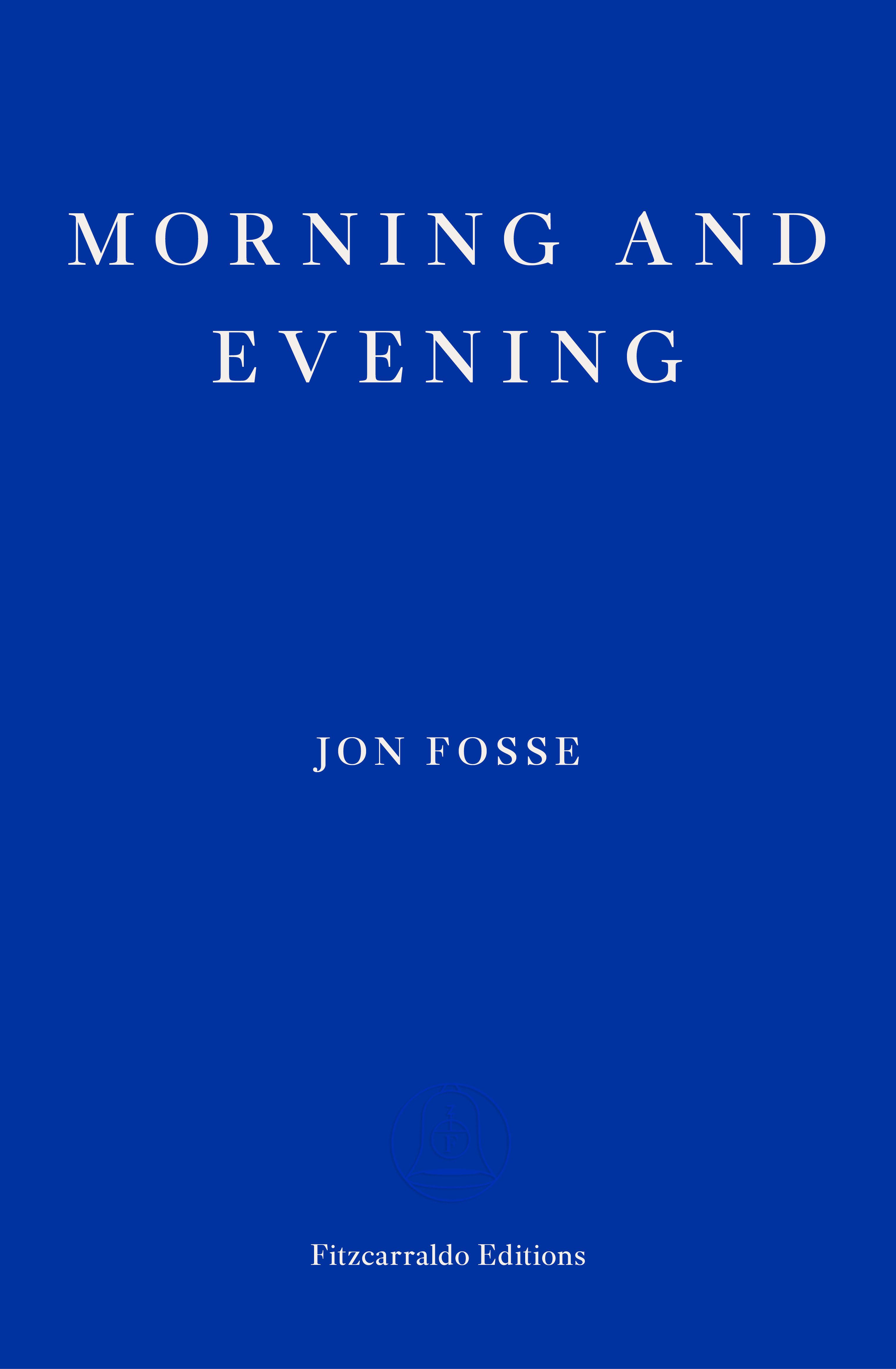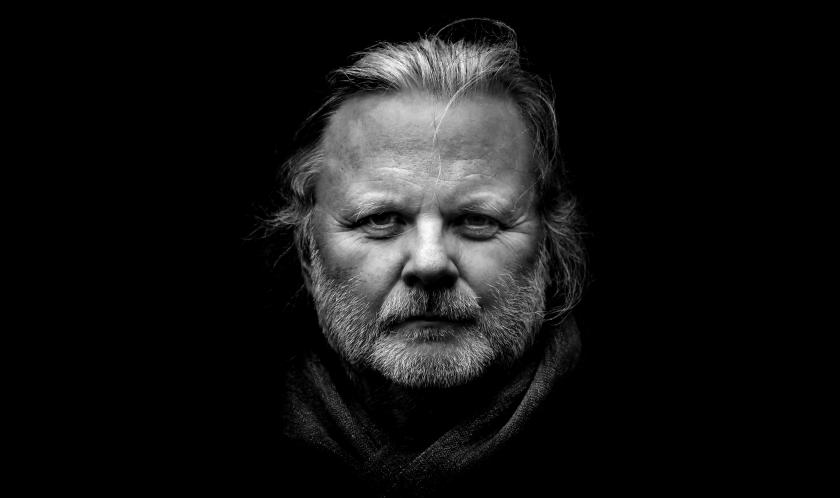Jon Fosse talks a lot about thinking. He also thinks – hard – about talking. His prolific and award-winning career in poetry, prose, and drama, might be said, in fact, to unfold a digressive single thought, uttered always in a characteristically reflective and deceptively simple grammar: "thinks" and "says" are the main verbs of this thought, the syntactic centres around which he constructs his gently serious investigations into the life and limits of various verbal worlds.
His books – "novel", "novella", or "short story" can seem aptly unjust – make repeated returns to the edges of descriptive possibility, to the indefinite blind fields of the unsaid. They are poised, that is, ever-wonderingly on the threshold between silent contemplation and our irrepressible need to explain.
This new Fitzcarraldo edition of Morning and Evening is no different. First published in 2000 as Morgon og kveld, Fosse, brought to English by the sensitive hands of long-time translator Damion Searls, tells the life-story of Johannes, the son of a fisherman from a small, sparsely-inhabited somewhere. Told in two uneven parts, we begin with the 13-page birth of Johannes. It’s a reasonable place to start for a life-story, but even more reasonable for a life-story that thinks about how we go about telling stories in the first place, about the impact of our voice on the world through which it issues:
he and his voice are separate but at the same time not separate and there is something else too, something he is a part of but he isn’t it because his voice slices through everything out there and comes back to him and gets louder and louder
This describes the first sound Johannes makes as he’s brought out from the comfortable dark of unbeing: Fosse recognises some kind of violence ("slices") at work in our acoustic orientation, but something supremely natural, too: at the same time the world and our being within it are mutually defined, as reality responds to and is shaped by our descriptions – however wordless – of it. "[S]omething he is a part of but he isn’t": it is this initial duality from which all else unfolds, a lifelong ambiguity rendered precisely by Searls' "a part’, which harbours its contrary – "apart" – within the irony of its own spacing.
 Then, in the blink of a page, Johannes the baby is an old widower, whom we follow for the rest of the book and to the end of his life. The narrative is spirited by the past – as it washes over the present – and bears, at all points, that typically quiet music of Fosse’s prose, the idiom through which he thinks, and which allows an elegant and complex disquisition on memory, loss, solitude, and companionship to take place. It is a story, in the words of Johannes’s father Olai, "from nothing to nothing". But: "even if it’s possible to think such thoughts, from nothing to nothing, it’s not like that, there is so much more to it than that, but what is this everything else?"
Then, in the blink of a page, Johannes the baby is an old widower, whom we follow for the rest of the book and to the end of his life. The narrative is spirited by the past – as it washes over the present – and bears, at all points, that typically quiet music of Fosse’s prose, the idiom through which he thinks, and which allows an elegant and complex disquisition on memory, loss, solitude, and companionship to take place. It is a story, in the words of Johannes’s father Olai, "from nothing to nothing". But: "even if it’s possible to think such thoughts, from nothing to nothing, it’s not like that, there is so much more to it than that, but what is this everything else?"
Good – vaguely Cartesian – question. But if you’re looking for an answer, Fosse isn’t your man; in fact, his narrative art is perfectly eloquent about what it doesn’t know: "no Johannes can’t understand any of it, not a thing, he thinks and turns around". Much more interesting – to Fosse and us – are the mysterious processes by which we remember, think, and speak, and the inherent misleadingness found in keeping such verb-categories discrete. "Johannes thinks" is the constant grammatical refrain, a rhythm and a pause, a punctuating force by which the book’s thought-experiment is, itself, conducted. It returns again and again, providing a structure but also a doubt: because it appears most often as a subordinate clause, it always points back to the words we have just read, and forward to what we’re about to read; it thereby becomes the book’s double-rhythm, creating an ever-present temporal ambiguation, extending into the future and framing the past. Thereby Fosse’s technique miraculously undoes certainty, describing Johannes' pre-afterlife existence through the articulations of grammar, as much as any narrative arc.
So, too, the dialogue. What we might otherwise call "free indirect discourse" again seems insufficient for Fosse’s mastery of spoken exchange. This, for the most part, exists between Johannes and his old (dead) friend, Peter, who acts as laconic guide for his friend’s final moment on earth. They discuss, and indeed relive, old jokes, marriage, bad days, near-deaths, and ones-that-got-away, all read in complicatedly simple vocal arrangements:
and Peter looks at him with a grin, like he wanted to remind him of something, and Johannes is startled and looks at Peter with frightened eyes
No now you’re joking, Johannes says
Joking, Peter says
Not at all, he says
Old Miss Pettersen, yes, old Miss Pettersen, he says
and Peter pauses for a long time
Akin most to poetic lines, voices come and go, break and echo, become each other, and dwell in the briefly eternal blank of page-space. I’m put in mind of Dante’s Purgatorio, partly because Fosse generates a similar sense of in-between-ness, but also, more technically, because the Comedia’s first printing predated the use of speech-marks. So, as with Fosse’s minor vocal indeterminacies, we would never have been quite sure who was saying what. It performs the weird ghostliness of Johannes' end-of-life lacuna: one voice and person and moment in time fades – near-imperceptibly – into the next. This dissolution between people is important for Fosse, as it mattered to Dante, partly because it is a book that thinks about the limits of identity as it is constituted by our voice; partly because our most simple exchanges can be fraught with these kinds of ambiguity; but also because it thinks, so truly, about the parts of us that exist in other people, and how they, in turn, become present in us.
Finally, as we approach the end, so does our power to describe that end: "Hard is a word, there aren’t any more words where we’re going, Peter says". In that passing syntactic ambiguity ("Hard is a word"), wherein "Hard" is both a noun and an adjective, and which Searle has so rightly cast in his English, is the incalculable space between living and dying. Words are all we have, which is the problem. Fosse, by drawing out the strange affinities between the spoken, the unspoken, and the unspeakable, causes the book to repeat, endlessly, an elegy not only for Johannes, but for its own being: the story has to end, which is a story in and of itself. At the book’s conclusion, which is really more of a transition, Peter attempts to tell Johannes, and us, what comes next: "it is big and calm and it vibrates a little, and it’s bright, if I had to put it into words, but the words don’t say very much". This, in fact, says more than it thinks: by acknowledging the ends of words Fosse articulates their endless, silent futures. In this, bliss can be achieved on earth, as well as after – or at least that’s what I think.
- Morning and Evening by Jon Fosse (Fitzcarraldo, £9.99)
- More book reviews on theartsdesk















Add comment